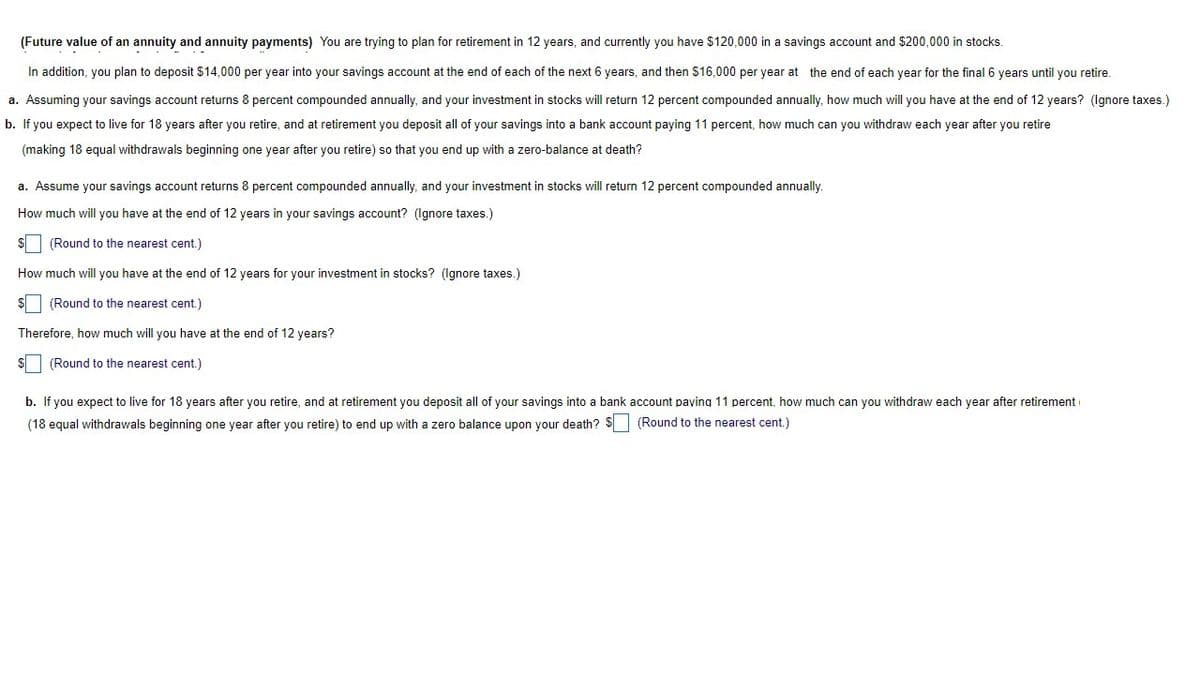a. Assuming your savings account returns 8 percent compounded annually, and your investment in stocks will return 12 percent compounded annually, how much will you have at the end of 12 years? (Ignore taxes.)
a. Assuming your savings account returns 8 percent compounded annually, and your investment in stocks will return 12 percent compounded annually, how much will you have at the end of 12 years? (Ignore taxes.)
Chapter5: The Time Value Of Money
Section: Chapter Questions
Problem 44P
Related questions
Question
fin320

Transcribed Image Text:(Future value of an annuity and annuity payments) You are trying to plan for retirement in 12 years, and currently you have $120,000 in a savings account and $200,000 in stocks.
In addition, you plan to deposit $14,000 per year into your savings account at the end of each of the next 6 years, and then $16,000 per year at the end of each year for the final 6 years until you retire.
a. Assuming your savings account returns 8 percent compounded annually, and your investment in stocks will return 12 percent compounded annually, how much will you have at the end of 12 years? (Ignore taxes.)
b. If you expect to live for 18 years after you retire, and at retirement you deposit all of your savings into a bank account paying 11 percent, how much can you withdraw each year after you retire
(making 18 equal withdrawals beginning one year after you retire) so that you end up with a zero-balance at death?
a. Assume your savings account returns 8 percent compounded annually, and your investment in stocks will return 12 percent compounded annually.
How much will you have at the end of 12 years in your savings account? (Ignore taxes.)
$ (Round to the nearest cent.)
How much will you have at the end of 12 years for your investment in stocks? (Ignore taxes.)
$ (Round to the nearest cent.)
Therefore, how much will you have at the end of 12 years?
$ (Round to the nearest cent.)
b. If you expect to live for 18 years after you retire, and at retirement you deposit all of your savings into a bank account paying 11 percent, how much can you withdraw each year after retirement
(18 equal withdrawals beginning one year after you retire) to end up with a zero balance upon your death? $ (Round to the nearest cent.)
Expert Solution
This question has been solved!
Explore an expertly crafted, step-by-step solution for a thorough understanding of key concepts.
This is a popular solution!
Trending now
This is a popular solution!
Step by step
Solved in 4 steps

Knowledge Booster
Learn more about
Need a deep-dive on the concept behind this application? Look no further. Learn more about this topic, finance and related others by exploring similar questions and additional content below.Recommended textbooks for you

EBK CONTEMPORARY FINANCIAL MANAGEMENT
Finance
ISBN:
9781337514835
Author:
MOYER
Publisher:
CENGAGE LEARNING - CONSIGNMENT

Pfin (with Mindtap, 1 Term Printed Access Card) (…
Finance
ISBN:
9780357033609
Author:
Randall Billingsley, Lawrence J. Gitman, Michael D. Joehnk
Publisher:
Cengage Learning

Principles of Accounting Volume 2
Accounting
ISBN:
9781947172609
Author:
OpenStax
Publisher:
OpenStax College

EBK CONTEMPORARY FINANCIAL MANAGEMENT
Finance
ISBN:
9781337514835
Author:
MOYER
Publisher:
CENGAGE LEARNING - CONSIGNMENT

Pfin (with Mindtap, 1 Term Printed Access Card) (…
Finance
ISBN:
9780357033609
Author:
Randall Billingsley, Lawrence J. Gitman, Michael D. Joehnk
Publisher:
Cengage Learning

Principles of Accounting Volume 2
Accounting
ISBN:
9781947172609
Author:
OpenStax
Publisher:
OpenStax College



Cornerstones of Financial Accounting
Accounting
ISBN:
9781337690881
Author:
Jay Rich, Jeff Jones
Publisher:
Cengage Learning